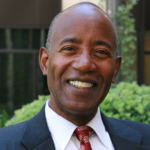SLS Faculty Weigh In on Recent SCOTUS Decisions in Roundup of the 2015 Term
In this roundup, Stanford Law School faculty members offer commentary on key SCOTUS decisions from the 2015 term (most issued in spring 2016), offering critical analysis.
Voisine v. United States Decision on June 27, 2016

Domestic Violence and Effectively Terminating the Gun Rights of the Dangerous by Professor John J. Donohue
Stephen Voisine, the named petitioner in today’s [June 27, 2016] key U.S. Supreme Court decision on guns, along with two prominent murderers killed by police this month show just how porous American gun laws are and what steps are needed to promote greater safety.
To some, Voisine is a perfect exemplar of the law-abiding citizen exercising his Second Amendment rights and fighting to retain them against the wildly over-zealous gun-controlling tendencies of the federal government. Justice Clarence Thomas was so moved by Voisine’s righteous struggle that he spoke at oral argument for the first time in over ten years, incredulous that the government would try to permanently suspend Voisine’s constitutional rights for nothing more than a misdemeanor conviction. Read more »
Fisher v. The University of Texas at Austin, et al. Decision on June 23, 2016

Did the Supreme Court Just Admit Affirmative Action is about Racial Justice? by Professor Richard Thompson Ford
The majority opinion in Fisher v. Texas, which upheld the affirmative action policy of the University of Texas, marks a turning point in the long controversy surrounding race-conscious admissions policies and perhaps an important shift in the orientation of the Supreme Court as well. Justice Kennedy, long the pivotal swing vote on the Court and a skeptic of affirmative action, voted to uphold UT’s policy.
It may seem at first that this marks an ideological shift to the left. But Fisher is more likely a long overdue recognition by the Court of the limits its own competence. In a move that infuriated the minority, the Court elected to leave calculations about the educational benefits of diversity to educators.
A happy side effect, whether intentional or not, is that the Court may have taken a step toward improving the candor and quality of debates about racial injustice—discussions it previously played a part in undermining. Read more »
Whole Woman’s Health v. Hellerstedt Decision on June 27, 2016
SCOTUS Whole Woman’s Health Decision: Casey Endures by Professor Jane S. Schacter
A whole body of legal scholarship that travels under the name of “law and society” is devoted to studying the difference between the “law on the books” and the “law in action.” The last 25 years of fights about a woman’s constitutional right to abortion have provided a stark example of this difference. In a landmark opinion, Whole Women’s Health v. Hellerstedt, the Supreme Court weighed in and took some important steps toward better aligning its decisions (“the law on the books”) with the reality of what is going on in the country (“law in action”). Its bottom line: The Constitution continues to impose real and meaningful limitations on laws limiting access to abortion and courts must take a meaningful look at the reasons given by a legislature for regulating in this area. Read more »
Law and Reality Half-Arrives in the Supreme Court’s Abortion Jurisprudence by Professor Hank Greely
Today, in Whole Woman’s Health v. Hellerstedt, the Supreme Court, by a five to three vote, reversed the Fifth Circuit Court of Appeals and reinstated the decision of the district court invalidating two aspects of Texas’s restrictive abortion statute, H.B. 2. Those provisions required all physicians at the clinic to have admitting privileges at an acute care hospital within 30 miles and further required that all abortion clinics meet all the requirements for outpatient (“ambulatory”) surgical centers. Read more »
Supreme Court’s Decision to Strike Down Parts of Texas Abortion Law , a Q&A with Professor Michelle Mello
The standards were completely unnecessary. Abortion is an extremely safe procedure; complications rarely occur. The facilities already had protocols in place to ensure safe transfer to hospitals in the event of an emergency. But when complications do occur, they usually arise after the woman returns home, so transfer from the facility to the hospital isn’t an issue. And there’s no reason a woman needs to receive emergency care from the same doctor who performed the abortion. Read more »
Cuozzo v. Lee Decision on June 20, 2016

Cuozzo v. Lee and the Potential for Patent Law Deference Mistakes by Professor Lisa Larrimore Ouellette
The Federal Circuit’s patent law losing streak was broken Monday with the Supreme Court’s decision in Cuozzo v. Lee. At issue were two provisions of the 2011 America Invents Act related to the new “inter partes review” (IPR) procedure for challenging granted patents before the Patent and Trademark Office. IPR proceedings have been melodramatically termed “death squads” for patents—only 14% of patents that have been through completed trials have emerged unscathed—but the Supreme Court dashed patent owners’ hopes by upholding the status quo. Patent commentators are divided on whether the ease of invalidating patents through IPR spurs or hinders innovation, but I have a more subtle concern: the Supreme Court’s affirmance means that the PTO and the courts will evaluate the validity of granted patents under different standards of review and different interpretive rules, providing ample possibilities for what Prof. Jonathan Masur and I have termed “deference mistakes” if decisionmakers aren’t careful about distinguishing them. Read more »
Utah v. Strieff Decision on June 20, 2016

Utah v. Strieff: A Bad Decision on Policing With a Gripping Dissent by Justice Sotomayor by Professor Ronald C. Tyler
The U.S. Supreme Court issued a significant Fourth Amendment ruling on June 20, reducing the populace’s protections from admittedly unconstitutional police conduct. The 5-3 decision in Utah v. Strieff is already reverberating among court watchers, legal commentators, and even ordinary folks who follow such noteworthy events. My own reaction is dismay over the majority decision and strong agreement with Justice Sotomayor’s powerful dissent. Read more »
Universal Health Services v. United States ex rel. Escobar Decision on June 16, 2016
The Supreme Court’s Decision in Universal Health Services v. U.S. ex rel. Escobar: Professor David Freeman Engstrom Answers Critical Legal Questions
The facts are tragic. A teenager named Yarushka Rivera sought treatment for bipolar disorder at a mental health facility in Massachusetts, with the tab for her treatment picked up by Medicaid. After five years of treatment, she had a bad reaction to a medication she was prescribed, suffered seizures, and died. She was 17. Her mother and stepfather soon learned that only one of the five professionals who treated Yarushka was licensed—a glaring violation of state Medicaid regulations. They brought suit under the False Claims Act, which imposes liability on “any person who . . . knowingly presents, or causes to be presented, a false or fraudulent claim for payment” to the government. Their basic argument was that the facility’s claim for Medicaid reimbursement was false because it failed to mention that the services provided to Yarushka had been provided in a way that flouted the licensing regulations. In legalese, Yarushka’s grieving parents claimed that the facility’s payment request was an “implied certification” that it had fully complied with those regulations. Read more »
Fact Versus Fiction in the Litigation Wars by Professor David Freeman Engstrom
The U.S. Supreme Court on Tuesday will hear a case that, even by law standards, seems technical and arcane. But the case is notable because it embodies much of what’s wrong with how we as a society talk about, and our elected leaders debate, the role of lawyers and litigation in our system of government. It also points to some possible fixes.
First, the case itself. You may not know it, but the False Claims Act empowers you and me to bring lawsuits on behalf of the United States against persons or companies who defraud the government in connection with federal spending, such as Medicare or defense contracts. If we prove that the hospital or military contractor ripped off the government, we earn a cut of the money returned to the federal fisc. We get to be, in the lingo, “private attorneys general” for the United States. Read more »
United States v. Bryant Decision on June 13, 2016

U.S. v. Bryant: Congress, Not Justices’ Interpretations of History, Better Arbiter of Tribal Sovereignty by Professor Gregory Ablavsky
On Monday [June 13, 2016], in United States v. Bryant, a unanimous Supreme Court determined that a federal statute could employ tribal court convictions that complied with the Indian Civil Rights Act (ICRA), but not the Sixth Amendment, as predicate offenses for a federal crime. Commentators have reasonably debated the merits of this outcome as a policy matter (e.g., here and here), but as a legal question, the conclusion seems correct. Though the Constitution does not apply to tribes of its own force, Congress has opted to extend nearly all the provisions of the Bill of Rights to tribes through ICRA; the right to appointed counsel for indigent defendants is one of the only omissions. The fact that these convictions are now being employed in a federal criminal proceeding does not transform them into federal convictions. On the contrary, declining to recognize constitutionally and statutorily valid tribal convictions would implicitly overrule the long-standing and oft-repeated precedent that the Bill of Rights does not directly apply to tribes, as well as Congress’s deliberate decision in ICRA not to apply the indigent right to counsel in this instance. Congress could require tribes to provide counsel at tribal expense—as it has already done, through the Tribal Law and Order Act, for any tribal court proceeding resulting in a punishment longer than a year. Given that the core of this dispute is over policy rather than legal interpretation, Congress, not the Supreme Court, is the best forum to resolve the question. Read more »
Halo Electronics, Inc. v. Pulse Electronics, Inc. Decision on June 13, 2016

Halo v. Pulse and the Increased Risks of Reading Patents by Professor Lisa Larrimore Ouellette
The Supreme Court just made it easier for patent plaintiffs to get enhanced damages—but perhaps at the cost of limiting the teaching benefit patents can provide to other researchers. Chief Justice Robert’s opinion in Halo v. Pulse marks yet another case in which the Supreme Court has unanimously rejected the Federal Circuit’s efforts to create clearer rules for patent litigants. Unlike most other Supreme Court patent decisions over the past decade, however, Halo v. Pulse serves to strengthen rather than weaken patent rights. Read more »
Puerto Rico v. Franklin California Tax-Free Trust Decision on June 13, 2016

The Fight to Relieve Puerto Rico’s Debt Crisis In Congress’s Hands by Professor Michelle Wilde Anderson
The significance of yesterday’s Supreme Court decision in Puerto Rico v. Franklin California Tax-Free Trust can be summed up this way: Puerto Rico is at Congress’s mercy.
The case strikes down Puerto Rico’s enactment of a municipal bankruptcy law, the Puerto Rico Public Corporation Debt Enforcement and Recovery Act, which was intended to bring creditors for the desperately indebted public utilities to a single negotiating table. Franklin held that Puerto Rico is trapped in a netherworld of Congressional making in which the territory cannot authorize its desperately indebted utilities to seek debt restructuring through federal bankruptcy law (Chapter 9), but nor can Puerto Rico write its own municipal bankruptcy law modeled on Chapter 9. Unlike the 50 states, it is thus removed from federal bankruptcy law’s benefits (access to restructuring), with federal bankruptcy law’s burdens (a bar against enactment of a municipal debt restructuring process under state law) still intact. That means no debt restructuring will be available for its utilities (let alone the island’s indebted central government) until a new federal statute is enacted. Read more »
Williams v. Pennsylvania Decision on June 9, 2016

Williams v. Pennsylvania and How Roles Shape Criminal Justice by Professor David Alan Sklansky
Williams v. Pennsylvania, the judicial recusal case the Supreme Court decided last Thursday, was as much about roles as it was about rules. Yes, the Court announced a rule: judges have to recuse themselves from any criminal cases in which they acted as prosecutors. But the case serves as a reminder that in our system of criminal justice, the people who serve as judges, prosecutors, and defense attorneys—their skills, their characters, and their professional self-conceptions—can matter as much as or more than the rules under which they operate. It reminds us, too, how much can ride on how we define these roles: how impartial we say a judge needs to be, what kind of officials we ask prosecutors to be, and what obligations and aspirations we think defense attorneys should assume. Read more »
Lynch v. Arizona Decision on May 31, 2016

The Death Penalty in its Death Throes? by Professor Robert Weisberg
Is the death penalty in its death throes? A pair of Supreme Court cases this week suggests an interesting pattern is emerging. We see Justice Breyer, carrying a legacy from the late Justice Harry Blackmun, dramatically seizing particular cases to declaim that the Court needs to finally say that the death penalty as a whole can no longer survive constitutional scrutiny. We see the Court dodging such foundational questions but nevertheless dramatically issuing abrupt summary reversals of death sentences when state courts, by affirming death sentences in the face of the Court’s minimal clear ground rules for capital punishment, engage in doctrinal insubordination. Read more »
Foster v. Chatman, Warden Decision on May 23, 2016

Foster v. Chatman and the Folly of Peremptory Challenges by Professor David Alan Sklansky
The Supreme Court’s decision earlier this week in Foster v. Chatman was notable more for what it showed than for what it said. What the Court said, 7-1, was that Georgia prosecutors violated the Constitution’s ban on racial discrimination in the 1987 capital murder trial of an African American man, Timothy Foster. Foster’s trial was held just months after the Supreme Court ruled, in Batson v. Kentucky, that prosecutors could not remove jurors based on race. Nonetheless the prosecutors in Foster’s case used their challenges to rid the jury of any black members, and notes in the prosecutors’ files–obtained years later by the defense through Georgia’s open records law—made clear that this was no accident. The notes flagged every black member of the jury venire, called attention to their race, and identified all of them as “definite NO’s.” On top of that, the ostensible, race neutral explanations the prosecutors offered in retrospect for striking at least two of the black jurors were transparently false, partly because the explanations applied equally or more strongly to white jurors the prosecutors left on the jury, and partly because the explanations kept changing. Writing for the Supreme Court, Chief Justice Roberts was visibly angered—and justifiably so—by prosecutorial justifications he dismissed as “nonsense” and “pretextual.” Read more »
United States v. Texas Case Argued April 18, 2016 (Per Curiam Decision on June 23, 2016)

Obama’s Unconstitutional Immigration Order by Professor Michael McConnell
One of the most closely watched cases before the Supreme Court this term is United States v. Texas, the immigration case that is scheduled to be argued on April 18. The Supreme Court surprised most observers when it asked the parties in that case to address a question they did not raise in their briefs: whether President Obama’s “Deferred Action for Parents of Americans” (DAPA) order violates the “Take Care Clause” of Article II of the Constitution. The Take Care Clause has never before been enforced by the Court and most people have probably never heard of it. Read more »
Evenwel v. Abbott, Governor of Texas Decision on April 4, 2016

SCOTUS Evenwel v. Abbott Decision: A Bullet Dodged by Professor Nathaniel Persily
A Supreme Court decision is often most notable as a bullet that was dodged, rather than a transformation that occurs. Such is the case with today’s unanimous ruling in Evenwel v. Abbott, in which the Court upheld Texas’s state legislative districts against a challenge that they violated the one person, one vote rule because they contained different numbers of eligible voters, even though they contained equal numbers of people. The decision is not a surprise, even if the unanimous ruling may have been. Evenwel was one of the most watched cases of the term—in large part because a decision in the Appellants’ favor would have led to widespread litigation around the country and a redrawing of thousands of legislative, municipal and even school board districts. The confusion of a decision in appellant’s favor would have been magnified by the fact that the census enumeration does not count eligible voters, so jurisdictions would have had to scramble to use survey results to estimate the number of eligible in each neighborhood. (These practical concerns were the subject of the amicus brief I filed in the case.) Read more »
Zubik v. Burwell Per Curiam Decision on March 29, 2016

Professor Michael McConnell on Zubik v. Burwell and the Importance of Religious Liberty
This is almost certainly good news for the religious plaintiffs. It suggests (though of course it does not prove) that the Court is not persuaded by the government’s argument in its briefs that the program did not impose a “substantial burden” on their religious beliefs. Most observers thought, before the oral argument, that this was the government’s strongest argument, but during the argument the Solicitor General appeared to back away from it and to focus instead on the government’s interest. Moreover, the instruction suggests the Court is getting into the regulatory detail, which is extremely complicated. This also is likely to be good news for the religious plaintiffs, because there are several straightforward ways the government could accomplish its objectives without imposing any burden on their conscientious beliefs. Read more »
V.L. v. E.L., et al. Decision on March 7, 2016

SCOTUS Ruling Affirms LGBT Parental Rights: VL v. EL Creates Important Protections for Families by Professor Jane S. Schacter
Like the Supreme Court’s blockbuster rulings on same-sex marriage, the Court’s recent decision in V.L. v. E.L. affirmed the respect due to same-sex families. Although considerably more limited in its scope than the Windsor and Obergefell rulings establishing marriage equality, V.L. creates important protection for families with LGBT parents.
The V.L. dispute concerned a family in which lesbian partners decided to raise a family together. There are hundreds of thousands of such families around the country, and many of them started their families at a time when they did not have a choice whether to marry. Read more »
Dollar General Corporation v. Mississippi Band of Choctaw Indians Argued December 7, 2015 (Per Curiam Decision on June 23, 2016)

At the Supreme Court: Contentious Questions of Tribal Jurisdiction in Dollar General v. Choctaw Nation of Miss. by Professor Gregory Ablavsky
In this case, a Choctaw family brought a civil suit in Choctaw court against Dollar General for the company’s conduct on tribal lands. The Choctaw court found that it could exercise jurisdiction over the case, and the Fifth Circuit agreed, leading to Dollar General’s appeal.
At core, the case is about a central issue concerning Native nations in the United States and the recognition of their sovereignty under federal law: the scope of their jurisdiction over non-Natives within their territory. For the past forty years, the Supreme Court has repeatedly addressed different iterations of this question. In 1978, in Oliphant v. Suquamish Indian Tribe, the Court concluded that Native nations had been implicitly divested of their criminal jurisdiction over non-Natives. But subsequently the Court explicitly declined to extend this holding to civil jurisdiction. Instead, in a series of cases beginning with United States v. Montana, the Court ruled that tribes could exercise civil jurisdiction over non-Natives in two circumstances: when the non-Natives had entered into a consensual relationship with the tribe or its members, and when non-Native conduct implicated the tribe’s political integrity, economic security, or health and welfare. Dollar General represents the Court’s latest effort to clarify the scope and meaning of this test. Read more »
2 Responses to “SLS Faculty Weigh In on Recent SCOTUS Decisions in Roundup of the 2015 Term”
Comments are closed.
Post Pagination




Alfred A. Porro, Jr
WoW!! Thank You for this positive update – Awareness is never bliss!! The direction and scholarship of this Court is clear. Indeed. They are not perfect and need our respect. Pray for them to re- attach to God and get off their “separation” of church and state interpretation of eviction of God. Our fore-fathers were mostly God loving and God protected folks.From this Divine cornerstone we – as a Nation have been BLESSED!!
God Bless America!!
God Bless!! Respectfully submitted, Al
Susan Swope
THANK YOU! This is a wonderful resource for us and helps to reiterate how important the work of the US Supreme Court is to all Americans. It also serves as a motivator for us to take interest and vote in the Presidential Election 2016 because of the influence the new president will have on Supreme Court appointments. Lastly, I think many of us think that the Supreme Court only rules on a few important cases because of the small number we hear about in the news (even as a regular listener to NPR’s Nina Totenberg!). Your analysis definitely shows that is not the case, and that they are a hardworking, committed arm of our government.